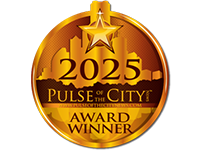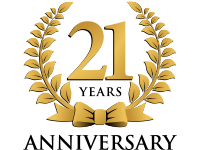
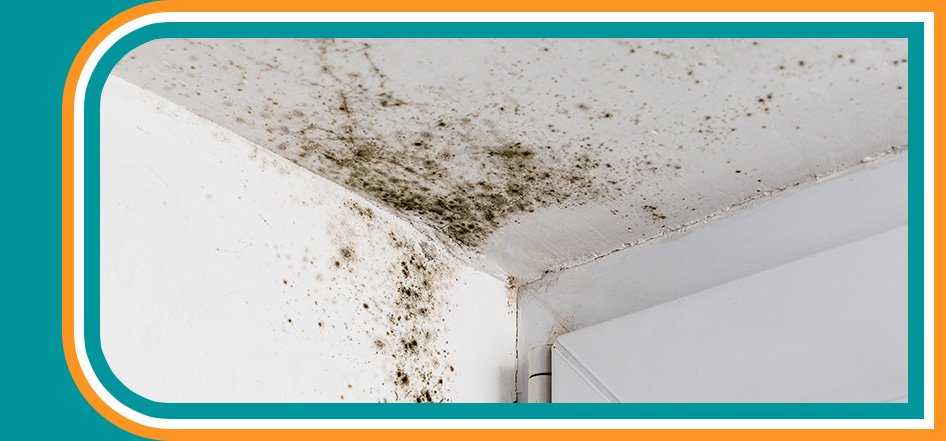
Mold Damage Services in Colorado
Mold Damage Restoration Solutions in Denver, Colorado Springs, and Aurora
Discovering mold on your property can be alarming, especially if there’s no immediately apparent cause for its growth. Putting off dealing with mold growth, no matter how small it may seem, allows it to spread and potentially cause health problems or structural damage. Instead of attempting a DIY fix, you need trained and licensed professionals to assess and fully address the problem.
At ECOS, our professionals are IICRC-certified in mold (AMRT) and water (WRT), meaning we understand how to effectively approach mold issues and their underlying causes. We can determine and resolve the source of growth on your residential or commercial property before using advanced tools and techniques to remove the mold and restore affected areas efficiently and safely. Our team also works well with insurance companies and is prepared to help streamline the claims process whenever possible.
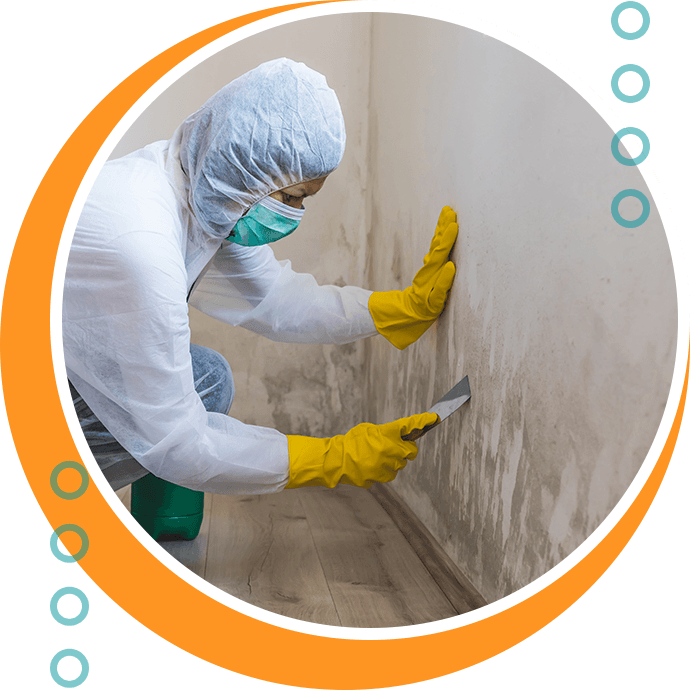

What Is Mold, and Why Is It Dangerous?
Mold is a type of fungus that thrives in damp, humid environments and reproduces through tiny spores. These spores float through the air and can settle on surfaces where moisture is present, leading to mold growth. Different types of mold vary in appearance, with some appearing black, white, green, or even orange. While mold exists naturally in the environment and plays an essential role in breaking down organic matter, its presence indoors can become a serious concern.
When mold grows in indoor spaces like homes, offices, or commercial buildings, it poses significant health risks. These risks are especially concerning for individuals with allergies, asthma, or weakened immune systems. Mold can release allergens and irritants that may trigger sneezing, coughing, nasal congestion, and skin irritation. Certain types of mold, like black mold (Stachybotrys chartarum), can produce mycotoxins, which have been linked to more severe health effects, such as respiratory disorders and neurological issues.
Mold also feeds on and breaks down organic building materials, including wood, drywall, and carpet. Over time, this can lead to structural damage, with mold growths weakening the integrity of walls, floors, and ceilings. Prolonged mold exposure also results in unpleasant odors, which can lower the comfort and livability of indoor spaces. When left unchecked, widespread mold infestations often require expensive repairs to replace damaged materials and restore the property.
The bottom line: Don’t overlook mold found inside a building. If you find any significant mold growth, do not wait to schedule a professional inspection!
What Can Cause Mold to Grow in a Building?
Mold can grow extremely fast and shockingly easily, flourishing under the right conditions in as little as 24 to 48 hours. Once it establishes itself, its spores can travel through the air and multiply in other areas of a building. Understanding the factors that accelerate mold growth is crucial, as it often takes little more than moisture, warmth, and organic material to trigger rapid development. Being proactive in recognizing and addressing these potential causes can save a property from unnecessary damage and protect its occupants from potential health risks.
Several factors can lead to rapid indoor mold growth, including:
- Excess moisture or leaks. Any consistent source of moisture is a primary trigger for mold growth. Leaking pipes, roofs, or poorly sealed windows allow water to accumulate in walls, floors, or ceilings. These damp areas can quickly become an ideal environment for mold to thrive. Even small leaks that are left unattended can lead to significant mold infestations.
- High humidity levels. Mold thrives in environments with humidity levels above 60%. Activities like cooking, showering, or drying clothes indoors without proper ventilation can raise indoor humidity levels, creating a breeding ground for mold in just a short period.
- Poor ventilation. Stale, stagnant air contributes to mold growth by trapping excess moisture in enclosed spaces. Areas like basements, attics, and crawl spaces are especially vulnerable if they lack proper airflow. Without circulation to remove moisture-laden air, these spaces quickly become hospitable to mold colonies.
- Flooding or standing water. Flooding from storms, burst pipes, or overflowing appliances often leaves behind water-soaked materials that take days or weeks to dry completely. When carpeting, drywall, and upholstered furniture retain moisture, they can create a fertile substrate for mold growth if not addressed immediately. Any substantial water damage should be addressed professionally to reduce the risk of dangerous mold growth.
- Organic material as food sources. Mold feeds on organic materials like wood, paper, and fabrics found commonly in buildings. When these materials are exposed to moisture for extended periods, they provide both the food and habitat necessary for mold to develop and proliferate.
- Temperature between 77 and 86°F (25 and 30°C). Mold typically grows best in warmer temperatures within a fairly narrow range. Buildings or rooms with consistently warm and damp conditions, such as humid bathrooms or kitchens, tend to foster an optimal environment for mold growth.
When you turn to ECOS for mold damage services in Colorado, we typically work with an independent air monitoring specialist to conduct comprehensive testing. This helps us determine the scope of the growth (including any hidden or hard-to-see pockets) and why the mold formed in the first place. We can walk you through what likely caused your mold infestation and what steps you can take to reduce the likelihood of future problems.

Why Choose ECOS?
-
We specialize in 24/7 emergency services to restore order as soon as possible.
-
We provide a full range of environmental, catastrophe, and residential services.
-
ECOS has been in operation for over 20 years.
-
ECOS provides a 1 year guarantee on your water damage repair service.
-
ECOS Technicians are IICRC Certified.
-
We work directly with your insurance company for a seamless process.
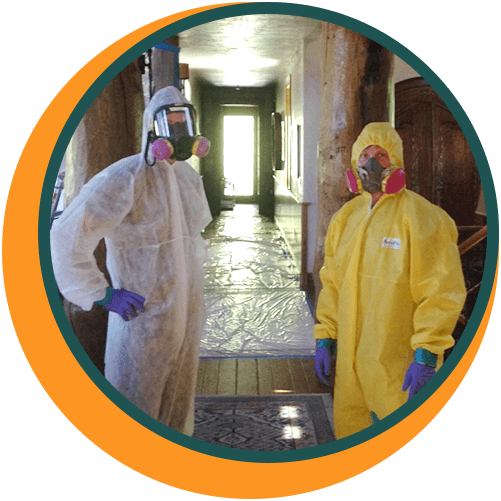
Potential Consequences of Ignoring Indoor Mold Growth
Ignoring indoor mold growth can lead to a wide range of serious consequences that impact both health and property. The consequences of unchecked mold growth are not merely cosmetic. They can compromise the well-being of a building’s occupants and the safety of the structure itself.
Letting mold grow indoors unchecked can lead to:
- Health problems. Prolonged exposure to mold can significantly impact respiratory health, especially for individuals with asthma or allergies. Mold spores circulate in the air and can cause symptoms like coughing, wheezing, nasal congestion, and throat irritation. People with weakened immune systems or chronic lung diseases face an increased risk of infections from mold exposure. Over time, frequent exposure may lead to more severe conditions like fungal infections or chronic respiratory issues.
- Structural damage to property. Mold feeds on organic materials like wood, drywall, and insulation, weakening the structural integrity of a building. Affected materials can eventually become compromised, leading to expensive repairs or even structural failure. Mold can also damage finishes like paint and wallpaper and reduce the aesthetic appeal and value of the property.
- Decline in indoor air quality. Mold releases spores and volatile organic compounds (VOCs) into the air, which can degrade indoor air quality. This creates an unhealthy environment, especially in enclosed spaces where ventilation is limited. Poor air quality affects the overall comfort and the health of everyone living in or visiting the property.
- Mounting financial costs. Ignoring mold growth often results in higher costs over time. Minor mold problems can evolve into extensive infestations that require more comprehensive remediation efforts. The expenses associated with repairing structural damage, replacing belongings, and addressing health-related issues can quickly escalate.
- Legal or liability issues. Property owners may face legal consequences if mold issues harm tenants or violate health and safety regulations. Lawsuits related to negligence or health impacts from mold exposure can result in financial and reputational damage, particularly for landlords and business owners.
Requesting our mold damage services in Colorado at the first sign of trouble gives our experts a chance to limit these potentially severe outcomes. We can remediate the affected areas and assist with any necessary restoration work.
We offer weekend appointments, so don’t wait to call (888) 868-5420 or contact us online if you find mold on your property!
